|
|
 |
Paxillus involutus.
Click a photo to enlarge it.
back to list
elpt
 |
 |
 |
| synonyms: Brown Rollrim, Kahler Krempling, Paxille enroul� |
 |
|
|
 |
| location: North America, Europe | | edibility: Poisonous/Suspect | | fungus colour: Brown | | normal size: 5-15cm | | cap type: Funnel shaped | | flesh: Flesh discolours when cut, bruised or damaged, Mushroom slimy or sticky | | spore colour: Light to dark brown | | habitat: Grows in woods, Grows on the ground |
 |
Paxillus involutus (Fr.) Fr. Kahler Krempling Paxille enroul� Brown Rollrim. Cap 5�12cm across, ochraceous or fulvous with olivaceous flush at first becoming more rusty-brown and finally hazel or snuff brown, viscid at centre when wet, downy throughout particularly at margin which remains inrolled, becoming smooth later. Stem up to 75 x 8�12mm, concolorous with cap becoming stained chestnut especially with age or on bruising. Flesh pale ochre in cap, fulvous in stem base, darkening on cutting. Taste acidic, smell fungusy. Gills decurrent, crowded, pale ochre then sienna, bruising vinaceous or chestnut. Spore print sienna. Spores ellipsoid, 8�10 x 5�6um. Habitat in broad-leaved woodland, especially with birch on acid heathland. Season late summer to late autumn. Very common. Deadly Poisonous � After eating over a period it has been known to cause death. Distribution, America and Europe.
|
 |
Members' images and comments
|
Click here
to upload and share your photos and comments about this mushroom (JPEG only please).
|
 |
 |
 |
john Baker (United Kingdom) - 01 August 2026

Surrey (Cobham) garden
|
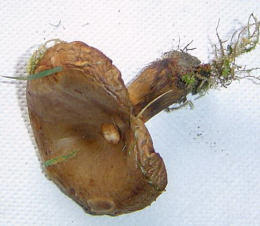
|
 |
lee collins (United Kingdom) - 28 April 2026

Brown Roll Rim
|
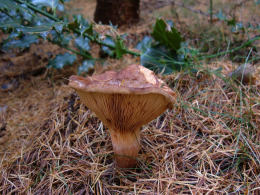
|
 |
Lorand Bartho (Hungary) - 09 March 2026

According to patients' reports, P. involutus is a tasty mushroom. Most people do not develop poisoning upon the first or first few consumptions. "Poisoning" of this mushroom involves a special kind of allergic reaction. Even properly cooked specimens contain an (unknown) allergen that, unfortunately, can be absorbed from the intestine. It then stimulates antibody production by the immune cells. This may take some time and may need more than one exposure to the allergen. The antibodes get attached (fixed) to red blood cells, and upon repeated consumption of P. involutus (i.e., re-exposure to the allergen) a dissolution of these cells (hemolysis) may occur, with potentially deadly consequences. Chills and elevation of body temperature as well as feeling sick may be the first symptoms, but the most dangerous complication is kidney damage, caused by the oxygen-binding compound hemoglobin, released from ruptured red blood cells.
|
 |
Lorand Bartho (Hungary) - 06 March 2026

|
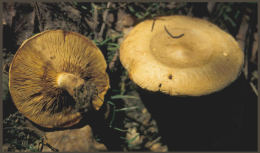
|
 |
Lorand Bartho (Hungary) - 06 March 2026

|
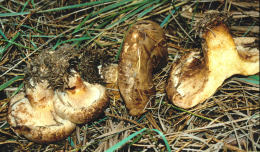
|
 |
Lorand Bartho (Hungary) - 06 March 2026

Hungarian name, Begöngyöltszélü cölöpgomba
|
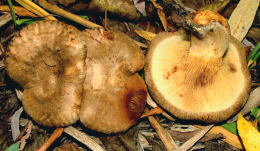
|
 |
|
 |
|
By uploading images and text you hereby warrant that you are the legal owner of this
material and agree, without limitation, to permit Rogers Plants Ltd to publish such
images and text on this Rogers Plants website. Rogers Plants Ltd reserves the right
to remove any member images or text at its sole discretion.
|
|

